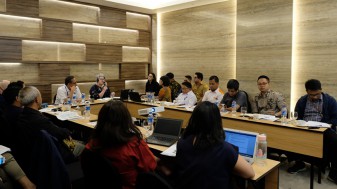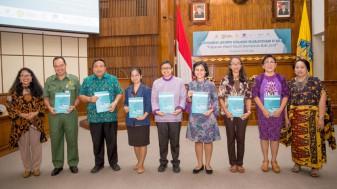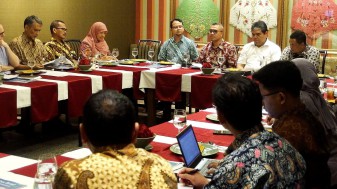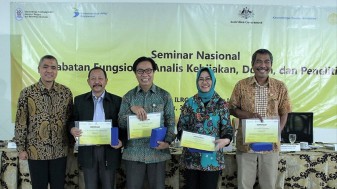The Covid-19 pandemic has had a huge impact not only on the health sector but also on the economic sector throughout the world. For this reason, existing development cooperation scheme needs to be refocused to support recovery from impacts of the Covid-19 pandemic in the new normal era.
The importance of international cooperation in the new normal era was discussed in the 23rd KSIxChange series held through a webinar session titled “Development Cooperation in the New Normal” on Thursday (4/6). This regular discussion event organized by Knowledge Sector Initiative was broadcast live on the Asumsi Youtube channel. The event was opened by the Minister of National Development Planning/National Development Planning Agency (Bappenas) Suharso Monoarfa, with moderator Nina Sardjunani from the National Secretariat for Sustainable Development Goals. The speakers for this discussion were Deputy for Development Funding at the Ministry of National Development Planning/Bappenas Leonard Tampubolon, Ambassador of South Korea Kim Chang Beom, Ambassador of Germany Peter Schoof, Chargé d’Affaires of Australia Allaster Cox, World Bank Country Director for Indonesia and Timor-Leste Satu Kahkonen, and for Indonesia Resident Mission-Asian Development Bank (ADB) Country Director Winfried F. Wicklein.
In his opening address, Suharso Monoarfa said that the crisis due to the Covid-19 pandemic is a global challenge that must be addressed together. No country is truly an expert, so each country must learn from one another and work together. Indonesia also continues to learn from countries that have succeeded in formulating appropriate policies. “The new normal is also an opportunity to revisit our conventional cooperation model, which previously was only between development partners and aid recipient countries, to become a multiparty partnership,” he said.
Deputy for Development Funding at the Ministry of National Development Planning/Bappenas Leonard Tampubolon explained that Indonesia has taken steps and adaptive policy to control the spread of Covid-19 pandemic, while at the same time addressing its negative impacts on the economy. The policy consists of four phases, namely improving health facilities, protection for vulnerable groups and economic actors, easing financial policies, and pandemic recovery program. The policy is also an effort in a transition towards a new normal. The first three phases are targeted for completion in 2020, and the fourth phase will be carried out in 2021. “Indonesia cannot enter the new normal on its own. We need stronger collaboration to design new development cooperation strategies in the new normal era,” he explained.
Ambassador of South Korea Kim Chang Beom assessed that the Covid-19 pandemic presents an opportunity to radically change cooperation at the global level. The world has become interconnected and interdependent so that a crisis cannot be solved by one country alone. For this reason, cross-border and holistic international cooperation is needed. In that context, the Covid-19 pandemic has become a new catalyst for strengthening the strategic partnership between Indonesia and South Korea. For South Korea, Indonesia is a priority partner. South Korea has provided emergency response support in a joint effort to tackle the Covid-19 pandemic. “Helping you is helping me,” he said.
Ambassador of Germany Peter Schoof explained that the German development cooperation approach both before and after the Covid-19 pandemic has been carried out based on three principles, namely adaptive, protection of policy sustainability, and restructuring of policy focus. The guide is useful for responding to any developments that occur, especially when the end of the Covid-19 pandemic spread is unknown. For this reason, development cooperation needs to be refocused with priority on the preparedness of the health sector, logistics and ensuring global supply chain for medicines. In the context of cooperation with Indonesia, Germany has provided support, such as through regional economic package issued by ADB and increase in contribution to WHO to ensure the distribution of vaccines as well as fair and equitable medical and laboratory needs, especially in the global south.
Responding to the impact of the Covid-19 pandemic, the Australian Embassy’s Chargé d’Affaires Allaster Cox mentioned three things that are the priority of Australia’s development cooperation going forward, which are health security, economic stability and social protection systems, and economic recovery. These three priorities underlie the new Australian funding program for the next three years. Budget reallocation has been done with a focus on these three things. “This is a fundamental transition process in terms of what we will do, and we need to focus on key sectors,” he said.
In Indonesia, besides reallocating funding to focus on the impact of the Covid-19 pandemic, Allaster Cox also stressed the importance of data coordination and utilization. Countries with accurate data will be able to get out of the crisis more quickly, thus the new normal will be closely related to data management and dissemination.
World Bank country director Satu Kahkonen said that in recent months the Bank has issued a number of policy packages to support the handling of the Covid-19 pandemic for countries in need. Indonesia has also benefited from the policy. For Indonesia, as a short-term response, the WB prepared a fund of about one million US dollars to finance the preparedness of the health sector, expansion of social protection, and to support the government in preparing fiscal and economic policies. As the crisis develops from the impact of the Covid-19 pandemic, the World Bank will continue to adjust its policies. “We will continue to support Indonesia through the crisis both financially and technically,” he said.
While Winfried F. Wicklein from the Asian Development Bank (ADB) said that over the past 20 years, Indonesia has experienced extraordinary progress that the poverty rate could drop below 10 percent. However, the current crisis has impacted unemployment numbers, taking away the poverty reduction gains made over the last couple of decades. As a result, ADB’s support for Indonesia will shift priorities to address the impact of the crisis, such as supporting the supply of emergency health equipment, and cooperation with the finance ministry and other key development partners.
Ending the discussion, Leonard Tampubolon from the Ministry of National Development Planning/Bappenas underlined the statements of the speakers that the Covid-19 crisis and the new normal have opened up opportunities to build better and stronger development cooperation systems. “Looking at today’s discussion, I believe that we can find answers not only for a new normal but a better normal for our joint development cooperation,” he said.
This online KSIxChange session attracted many participants with a total of 2087 registrants via Zoom. The online discussion through the Zoom application was attended by 1,328 participants from Indonesia and a number of other countries. Enthusiasm in the discussion could be seen from the 54 questions from the discussion participants. During the live broadcast session on Youtube, the total number of viewers reached 2,500 with 228 comments.
KSIxChange # 23 online discussion is a collaboration between the Knowledge Sector Initiative and Bappenas that brings together the Indonesian Government and international development partners. The purpose of this discussion is to discuss and explore cooperation potential and commitments between the development partners to continue supporting the Indonesian government in the new normal era. Bappenas plans to hold similar discussions with other development partners to continue exploring the cooperation potential and commitment to be increasingly adaptive in the current pandemic situation.





